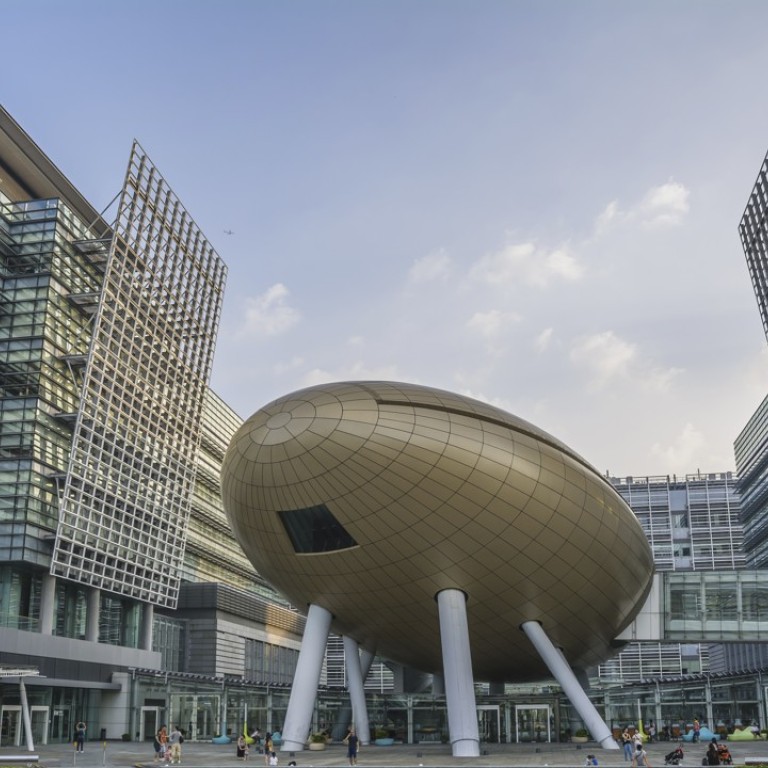
Will cash boost for Hong Kong Science Park drive real innovation?
Firms at the science and technology hub tell the Post that its support has been vital for start-ups and young businesses
Since its founding in 2001, Hong Kong’s Science Park has adhered to a straightforward strategy – “build a tech-based ecosystem that connects stakeholders, nurtures talent, facilitates collaboration, and drives innovation to commercialisation”.
From just over a dozen companies present on its opening day, the number has grown significantly. More than 600 firms now call the park home – over two-thirds of them local – plus another 62 at its InnoCentre and 165 at its industrial estate.
The number of start-up companies in its incubator programme alone grew by 12 per cent in 2016 and has produced a fair share of success stories.
The question is: will it help?
All eyes on Hong Kong’s Science Park after massive HK$40 billion budget handout
While ideas abound about what the park should do with the money, most tenants agree that the science park’s facilities have been invaluable for Hong Kong technology companies, especially start-ups.
Jimmy Tao Wai-leung, chief executive of Vitargent (International) Biotechnology “graduated” from the park’s start-up incubator programme in 2015. He said there was no way any start-up would be able to afford office and lab space in Hong Kong outside the incubator programme.
Hong Kong’s Science Park to take the lead on driving innovation and technology as it receives major cash injection
“The most important is the rent-free period,” Tao said, referring to the first two years of the programme in which incubatees can focus on their research without having the burden of rents hanging over the head.
Rent for the third and fourth years are subsidised at 50 per cent but from there on, the companies are on their own. That is where Tao believes the park jumps the gun.
“We are paying HK$40 per square foot for office and lab space now, which is about 20 per cent of our overhead,” said Tao, whose start-up pioneered the use of certain fish embryo for toxicity tests across various industries.
“The lab facilities are really world class but the incubator programme is too short. Most research and development work in the biotech sector takes at least 10 years.”
Stanford, MIT, Johns Hopkins University and Waterloo University eye Hong Kong as regional base for stem cell research
“There is never a shortage of infrastructure – they have even more in the mainland. It should be about how you attract talent to live and work in Hong Kong and providing them with support.”
They should be fostering technology development in Hong Kong, commercialisation and showcasing it to the world
He suggested that some of the money be used to ease the living costs of employees of companies, especially research talent from overseas that have come to Hong Kong to work for tech companies. Dormitories for example, could be built on-site, he said.
Jeff Lin, co-founder of smart-city solutions provider Liricco Technologies, which is still based out of Science Park, was one of the first batches recruited as part of the incubation programme. “For larger companies, it’s really about the co-system effect,” he said.
Hong Kong leader doubles R&D expenditure to HK$45 billion for next five years to boost ‘smart city’ innovation
He believed more money should be spent on purchasing technology produced by local companies and applying it to the park. “They should be fostering technology development in Hong Kong, commercialisation and showcasing it to the world,” he added.
There is more that the government could be doing too, he said.
Emotics chief executive Raymond Horan, whose start-up uses artificial intelligence for compliance analysis in the financial industry, said that while such technology requires lots of research and thus “can’t be commercialised instantly”, the Hong Kong government could to do more to connect start-ups with corporations in the city and therefore assist start-ups in commercialise their product.
Hong Kong reboots with ‘back to the future’ budget as Paul Chan splashes HK$50 billion on hi-tech spending
Keith Rumjahn, co-founder of Famfit, which uses artificial intelligence to analyse and help improve people’s fitness, said that an injection of HK$10 billion into the Innovation and Technology Fund (ITF) and the focus on improving research is a step in the “right direction”, but emphasised that execution is key.
“This is forward thinking, and it’s better than giving every start-up HK$10,000 because that creates no long-term value,” Rumjahn said. “The question is how much of such funds will actually be given away? Often, it takes so long to get the money and by then the start-up would be dead.”


